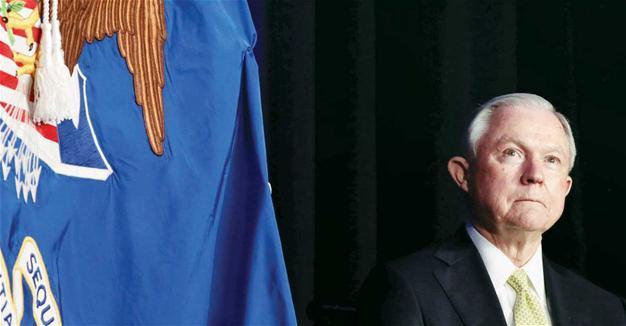US attorney general next in scandal’s spotlight
WASHINGTON

Jeff Sessions, a longtime senator until President Donald Trump picked him as U.S. Attorney General, heads to Congress next week where he could face a grilling about his Russian interactions.
Sessions, among the earliest high-profile backers of Trump’s election campaign, will appear before his former colleagues on June 13, days after explosive testimony by ousted FBI director James Comey, whose removal he recommended.
The Senate Appropriations Committee has called in the attorney general to testify about budget issues but reports that Trump may be wavering in his choice as the nation’s top law officer, as well as the revelations of recent days, will likely lead senators to zero in on his connections to Russia.
“This is going to prompt a lot of questions for him,” the panel’s top Democrat, Senator Patrick Leahy, told AFP of an appearance in which lawmakers will be eager to learn what role Sessions played in Comey’s firing last month.
Concerns have also been raised about whether Sessions helped otherwise subvert the ongoing Russia-related investigations.
With reports circulating that Trump had been clashing with his attorney general in recent weeks, and that Sessions had offered to resign, the White House on Tuesday declined to say whether the president maintained confidence in Sessions.
And in a stunning moment of inside-the-Beltway intrigue, Comey dropped a bombshell about Sessions as he told senators about how he and other top FBI officials concluded that the attorney general was going to recuse himself from the probe.
“We also were aware of facts that I can’t discuss in an open setting that would make his continued engagement in a Russia-related investigation problematic,” Comey said.
Although Sessions, a genteel 70-year-old from the southern state of Alabama who served 20 years in the Senate, backed Trump’s campaign he was also one of the first administration officials to fly into turbulence. During his January confirmation hearing he failed to disclose meetings with Russian officials.
On March 1, The Washington Post reported that he met twice with the Russian ambassador, Sergey Kislyak, during the campaign.
The following day, Sessions recused himself from the Russia probe, and several top Democrats, including House Minority Leader Nancy Pelosi, urged him to resign.
Sessions may also be under a cloud of suspicion after Comey, in his devastating testimony, suggested the attorney general may have failed to take appropriate steps to protect the FBI chief.
At the conclusion of a February 14 meeting in the White House, Comey testified, Trump urged everyone else but Comey to leave the Oval Office, including Sessions.
“My impression was, something big is about to happen,” Comey said, as he recalled the encounter.
“My sense was the attorney general knew he shouldn’t be leaving,” Comey added.
When the two men were alone, Trump urged Comey to stop the investigation into fired national security advisor Michael Flynn.
In written testimony Comey said he told Sessions it was “inappropriate” for him to leave the FBI director alone with the president, and that Sessions “did not reply.”
With Sessions already under fire for failing to disclose the two meetings with Russians, CNN reported last week that investigators were looking into a possible third Sessions meeting with Kislyak, on the sidelines of an April 27, 2016 campaign event in Washington.
Despite his recusal, Sessions in May signed a letter to Trump recommending he remove Comey, the man overseeing the investigation into Russian election meddling and the possible Russia-Trump nexus.
Lawmakers and critics have expressed concern about any possible role by Sessions in either sacking Comey, or in subverting the ongoing investigation by the FBI.
“There remain a number of questions about his own interactions with the Russians,” Republican Senator Susan Collins told CNN on June 9.
“We on the Intelligence Committee want to know the answers to those questions, and we have begun to request information from the attorney general to allow us to get to the bottom of that.”
With the Russia story spreading, the Justice Department in May appointed former FBI director Robert Mueller, widely respected within both parties, as a special counsel to head a separate Russia probe.
 Jeff Sessions, a longtime senator until President Donald Trump picked him as U.S. Attorney General, heads to Congress next week where he could face a grilling about his Russian interactions.
Jeff Sessions, a longtime senator until President Donald Trump picked him as U.S. Attorney General, heads to Congress next week where he could face a grilling about his Russian interactions.